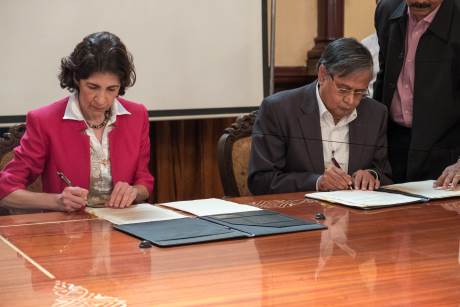India is set to become an associate member of European particle physics research organisation CERN, subject to final approval by the Indian government. The move followed the signature of an agreement by CERN's director general and the chairman of India's Atomic Energy Commission (AEC).
 |
| The agreement is signed by Fabiola Gianotti, director general of CERN, and Sekhar Basu, AEC chairman and secretary of India's Department of Atomic Energy. (Image: CERN) |
India signed a cooperation agreement with CERN in 1991, although Indian physicists have been actively participating in experiments at CERN since the 1960s. In 1996 the AEC agreed to take part in the construction of CERN's Large Hadron Collider (LHC), and India has participated in numerous experiments and initiatives, including establishing LHC Computing Grid centres in Mumbai and Kolkata. India was granted Observer status to the CERN Council in 2002.
Associate Membership status will allow India to take part in meetings of the CERN Council and its committees, and will make Indian scientists eligible for staff appointments. Indian industry will be entitled to bid for CERN contracts, opening opportunities for industrial collaboration in areas of advanced technology, once the agreement enters into force.
CERN, the European Organization for Nuclear Research, is headquartered in Geneva.
Researched and written
by World Nuclear News














